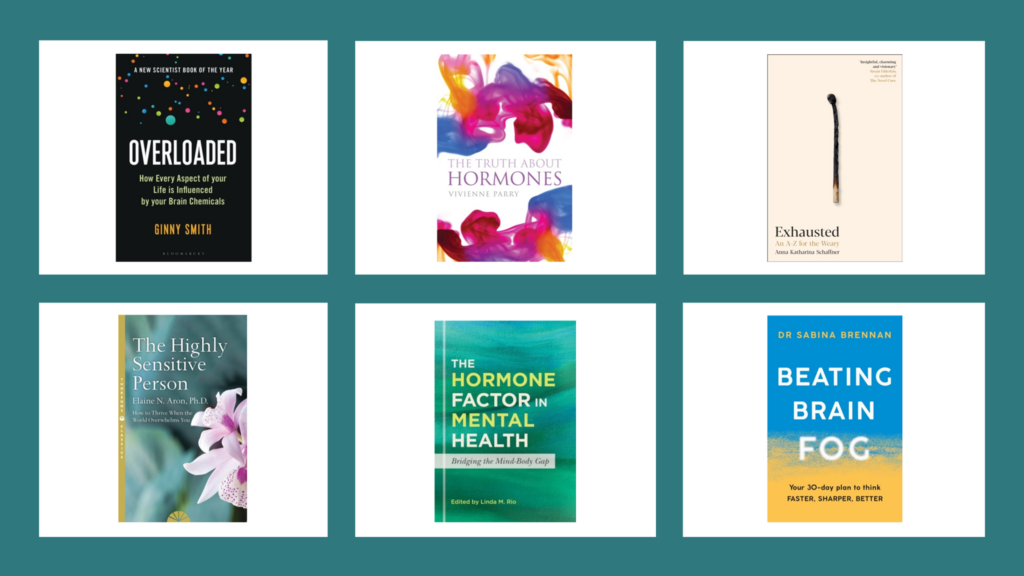One of the things I often get asked is, ‘Is there a book that will help me to understand my pituitary condition?’ Unfortunately, a lot of the books about endocrinology are aimed at healthcare professionals and written in technical language with lots of scientific jargon. That said, there are some books that could potentially be helpful.
My top recommendation is always Viv Parry’s book The Truth about Hormones. Taking a lifespan approach (from childhood onwards) she talks about the different hormones that matter as we progress through life. It’s very readable with some very drole and dry asides and talks you through how hormones are supposed to function. Another book which can also help you understand how hormones work is Ginny Smith’s book Overloaded. Subtitled: How every aspect of your life is influenced by your brain chemicals. Smith describes what the latest research tells us about how our neurotransmitters (which are also hormones), are involved in things such as memory, pain, falling in love, and sleep. She aims to show how the different systems are linked and why problems in one area, can potentially cause problems in another.
The book that most clearly explains about the various pituitary conditions and how they affect people is Linda Rio’s The Hormone Factor in Mental Health. Rio has got top endocrinologists to write chapters about the various pituitary conditions and interspersed them with accounts from people with those conditions. In places it’s very hard to read – pituitary conditions are difficult to live with, difficult to diagnose and treat. Rio’s book pulls no punches when it comes to telling people’s stories about the problems they’ve had and, in some cases, continue to have despite the treatment they’ve been receiving. Those of you affected by adrenal insufficiency, might also be interested in Winslow E Dixon’s book called Adrenal Insufficiency.
As for books on coping with pituitary conditions, there’s not very much on offer. I often recommend Elaine Aron’s book The Highly Sensitive Person. Because while she never mentions the endocrine system or pituitary conditions, the sensitivity that she describes can be experienced by people because of their pituitary conditions. She has some good suggestions as to how to reduce the overstimulation and overwhelm that can be part and parcel of life with a pituitary condition for some people. Like Parry’s book on hormones, Aron’s book takes a lifespan approach. She assumes that you’re only discovering the topic of highly sensitive humans as an adult, and by talking about how sensitivity manifests itself across the lifespan she aims to help people understand whether they were born highly sensitive, or if they became so because of life events such as trauma or illness.
I’ve also taken to recommending Sabina Brennan’s book Beating Brain Fog. Brennan is a neuroscientist with a chronic health condition which causes her to have problems with pain, fatigue, and brain fog. When her condition is bad, she struggles to work and to maintain personal relationships. Written during the pandemic lockdowns, Brennan’s book documents the approaches she uses to help her to manage her condition. She talks about the science behind the various symptoms that can lead to brain fog and mental confusion and offers a 30-day (four-week) plan aimed at improving quality of life. She pinpoints issues with sleep, stress, exercise and nutrition and she shares the daily routine that she follows to manage her own condition. There are some good ideas in the book, and it’s a good starting point for thinking about how you might want or need to manage your pituitary condition.
Fatigue is a common problem for people with pituitary conditions. Several of the authors I’ve already mentioned have things to say about it, for example, Smith, Brennan, Aron and Rio. But there’s also a new book on the block by Katherine Schaffner called Exhausted. Subtitled: An A-Z for the Weary, it takes the reader through 26 words in alphabetical order that can help us to think about and understand where our fatigue might be coming from. This is a good book for those who are family members or carers for people with pituitary conditions, because it has a lot to say about how we think about the time and energy we have and how we spent that in living our lives. Schaffner is a life coach, and each chapter ends with some thoughts about how what she’s been covering can be turned into action that we can apply to our own lives.

Books can help us to understand the biological processes involving hormones and some of the problems we might encounter when they aren’t working as they should. But there is a real lack of literature that helps people to understand the psychosocial impact of living with long term health conditions. The Pituitary Foundation has lots of booklets to help people understand their specific pituitary condition. Their library includes the Wellbeing series based on research which examined the psychosocial impact of pituitary conditions undertaken by researchers at the University of the West of England (of which I was one) with members of the Pituitary Foundation. There are four booklets in the series (so far). The first, Diagnosis & Treatment, describes the process of diagnosis and highlights the issues that people face. The next in the series, Your Journey, considers what life can be like in the longer term, after the acute diagnosis and treatment phase. Relationships & Communication starts by focussing on self-esteem and how it can be affected by developing a pituitary condition. It then moves to describing the problems that can occur in the relationships that people can have covering everyone from partners, siblings and children through to workplace colleagues and strangers. The final booklet in the series is Living with Infertility, a heartbreaking reality for some people with pituitary conditions. All the booklets in the wellbeing series aim to reflect what the researchers were told while protecting the contributor’s identities, and all offer suggestions for coping alongside documenting the challenges and difficulties that people can face.
By Dr Sue Jackson
Sue is an independent chartered psychologist and Associate Lecturer at Plymouth University. She also works as a consultant for a variety of charities and pharmaceutical companies. Sue is a science writer and researcher working on a variety of projects round the UK.








